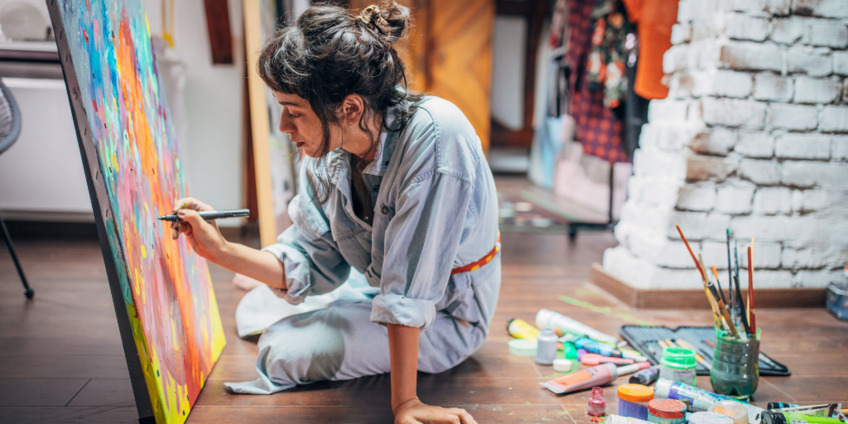BUSINESS SUPPORT & TRAINING
Taking your arts business to the next level

Whether you are just starting out in the creative world or you are an accomplished professional artist, growing your business and reaching new audiences takes time and dedication. Luckily, art is one of those wonderful pursuits where you can constantly develop, and you’ll definitely never run out of things to learn. So how does one go about taking their art business to the next level?
1) It’s all about having a plan
Like any business starting out, a business plan will guide you in mapping out the basics. Ask yourself - what is your mission and how do you define success? The answers to these questions will underpin the direction of your business and give you some focus. We’ve found a great worksheet for you to put pen to paper to set some SMART goals for the year ahead. Link To Workbook
A really important, and unfortunately unavoidable, part of owning your arts business is planning for the future financially. Start by creating an itemised list of everything you need and how much it costs. Include things like your materials, any potential rent, shipping costs and don’t forget your time - you are a professional artist now and your time is a very important component of the business! By understanding the costs of everything that makes up your business, you can then formulate a plan on how you are going to cover all the expenses, and of course make yourself a profit.
A secondary part to consider with finances is the pricing of your art. Pricing can be one of the most difficult things for artists to figure out, but it’s so important to make sure you’re not out of pocket. This is where the above financial planning comes into play. By knowing your costs, skill level, education and time you can ensure these are reflected in the price of your work.
2) Not all customers are created equal
You need to identify your target audience. Think about what your ideal customer looks like - that's the person that you think is most likely to buy your art. There’s a number of ways you can do this, but some really important questions to answer are:
- What age group or income level are they on?
- What does your customer want to achieve from buying your art?
- Where do your customers go (this can be from where they live and work, where and how they travel, to where their hobbies may be, and where they go to buy their art)?
- What types of customers will understand your work?
- What kind of marketing would reach them best?
By answering these questions, it will help you to market your art in the most effective way. You’ll be in a better position to know where to show off your work, how you can form important relationships with your buyers, and learn how best to engage with them confidently.
As well as getting to know your target audience, it’s just as important to know about other artists in your field. Yes, it is a good idea to research competitors to understand what they are doing, but it can be far more beneficial to find people that you could collaborate with. Collaboration sparks creativity and forges great relationships between artists. The majority of creatives will be working solo, so it’s important to find like-minded individuals who you can learn, connect and bounce ideas off of.
3) Keep learning
Being a professional artist not only means you’re skilled creatively, but you are now also a business owner! From sales and marketing to keeping on top of accounts, it’s important to have a general understanding of all business functions in order to grow and be successful. So, in addition to developing your creative side, invest time and funds into learning the ropes of being a business owner.
You could aim to go on one training course per month. If money is tight, then there are loads of great free events and workshops that you can sign up to. Take a look at what workshops and courses are available over the next six months, and book onto them. Don’t just think about - make the booking. Once it’s in the diary then you’ve committed yourself and you will be less inclined to find an excuse not to go. This is an activity that should be done regularly throughout the year as events will constantly be popping up.
To kick you off nicely, here at Signal we run training and events in Bordon. Take a look at what’s coming up and see if there’s anything for you.
https://www.signalbizhub.com/events-training
4) Showcase your work
What’s the point in creating these magnificent pieces of art if you’re not going to show them off? There’s a huge selection of ways to get your art out there and it can seem a bit overwhelming to start with. Number one top tip - focus on doing a few things really well rather than overextending yourself (just make sure you’re focusing on where your target audience actually are).
A good place to start is with an inspiring, personable and easy to navigate website. This is also where most, if not all, your other online platforms will point your customers to for them to make that all important purchase. If you’re no website designer, then there are lots of supportive online tools to help you.
There are never ending social media platforms, but out of them all, Instagram is a great place to be seen. Your profile needs to be professional with high quality photographs of your art, along with unique and read-worthy captions. Not only is Instagram a place to share your work, but it is also a great tool for research. At the touch of a button and with a bit of scrolling you have access to a huge amount of information. Instagram can help you to keep up to date with trends, find out what other local artists are doing and find where your collectors are buying from.
An online presence for your business is fab, but there’s nothing quite like buyers seeing your work in the flesh. Take time to find galleries, local restaurants, markets, art exhibitions or wherever you feel your art will be best placed. You could consider the SiGNAL Studio at The Shed in Bordon, where we exhibit a wide range of local artists’ collections. It’s also important to think outside the box. It might be that not only can you show off your physical pieces of art, but you could also run a creative workshop or tutorial to show off your skills - this will in turn would help to get your name out there.
Establishing yourself in the creative community and making a living from your work isn’t going to happen overnight. But with planning, time, effort, and a dedication to lifelong learning it’s certainly not impossible. So, enjoy this journey of growing your arts business and be proud of what you achieve along the way ??" we want to see your happy dances with every new sale!
If you need a bit of inspiration, visit us at the Studio, come along to a LinkedIn Local or Bizhub, or have a read of the following...
https://theworkingartist.com/this-artist-was-homeless-until-art-saved-him/
https://www.getsurrey.co.uk/news/local-news/award-success-mother-author-illustrator-4818495







